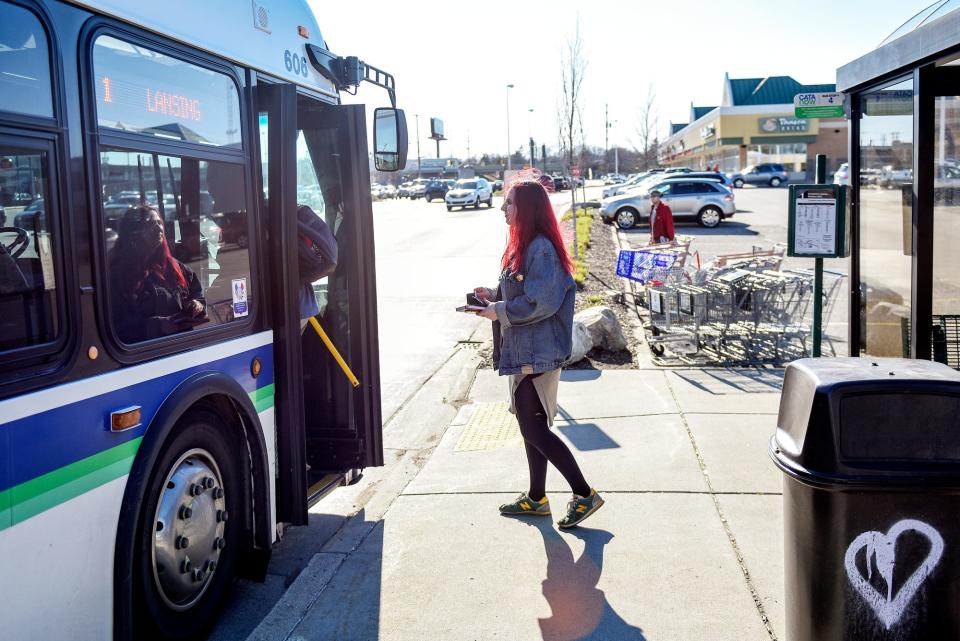'What else are you going to do?': Advocates report increase in street homelessness
Much of Desiree Kaiser's home was packed onto a cart Tuesday morning, as she sat next to her friend Darcy Wildman under a parking structure on East Lenawee Street in Lansing.
Kaiser, 29, who is seven weeks pregnant, became displaced just Monday. Wildman, 36, who suffers persistent seizures stemming from a traumatic brain injury, has been homeless for about five years.
Hours before ending up under the parking structure where she ran into Wildman, Kaiser said police ordered her and her boyfriend to vacate a unit they'd been staying in at Rotunda Trailer Park, along Old U.S. 127 in DeWitt Township. Residents received notice of the mobile home park's imminent closure in March.
"We're just gonna try to find a motel room for tonight. I'm not sure where else to go since it's difficult to find any shelters or housing that allow cats," Kaiser said while her 2-year-old, black cat, Bear, meowed from inside a mesh carrier. "I have PTSD and this cat is my service animal."
According to Advent House Ministries, a Lansing-based nonprofit serving the homeless, Kaiser's experience is one that's become increasingly common this year. Between July 2021 and September 2022, Advent House’s street outreach team reported a 500% increase the number of homeless people they encounter, team leader Brittany Kelley said. In that time period, staff went from working with 50 clients to more than 250 people, she said.
The reported increase represents a stark change from several years of declining numbers. Officials and advocates say the weakening of the social safety net, bolstered in recent years by pandemic stimulus money, is a key factor. They're turning to partnerships with businesses and other community stakeholders that often see the effects of an inflationary rental market and social spending cuts pushing people to the street.
Scott Bean, spokesperson for Lansing Mayor Andy Schor, said the city is raising funds for two more staffers to join Projects for Assistance in Transition from Homelessness, Kelley’s team.
Kelley and her team of five social workers take to Lansing's streets four times per week in search of people experiencing homelessness so they can connect them to available resources. But recently, the support they can offer has been limited.
"My job is a resource broker and an advocate," Kelley said. "I cannot broker resources that don't exist. There have been several times that I've called for trying to find a bed for an individual, or a family, and a bed has not been available."
A historic safety net fades away
In 2021, homelessness declined by 2% across the state to about 30,000 people, according to an annual report issued by Michigan Campaign to End Homelessness, a statewide initiative. Across Ingham, Eaton and Clinton counties, homelessness rates stayed flat after a 19% decrease the previous year, which officials attributed to eviction diversion programs, COVID-19 stay-at-home orders and clients choosing not to seek service in congregate settings amid the start of the pandemic.
The statewide trend was part of a significant decrease in poverty nationwide. The number of Michiganders living in poverty fell to 7.6% in 2021, according to a U.S. Census Bureau report. The Census measures the metric by averaging data from three years. From 2015 to 2017, that figure stood at 11.3%.
“What we see in the data, throughout 2021, mainly, is you see really rapidly declining rates of material hardship,” said Patrick Cooney, director for Policy Impact at Poverty Solutions, an institute within the University of Michigan that studies policies alleviating poverty.
He pointed to the Census Bureau’s Household Pulse Survey, which tracks different metrics measuring a households’ material well-being, such as employment, health, food sufficiency and housing. Many measures improved in 2021, which Cooney credits to the “pandemic safety net” — economic relief provided by the federal government throughout the pandemic, such as stimulus checks, extended unemployment assistance, the child tax credit, emergency rental assistance and more.
But that trend has not continued into 2022, Cooney said.
“By and large, these supports have kind of all dwindled down, and so what we’re seeing now in the data is we’re seeing a lot of the gains that were made in 2021 in the fight against poverty … reversed in 2022,” Cooney said. “We’re seeing increasing rates of material hardship — increasing rates of food insufficiency, increasing rates of financial instability. And we think that poverty numbers always come with a year lag.
“This is a function of this unprecedented safety net, that we had in the past few years, kind of just going away,” he said.

When Kelley and her team connect with new clients, they ask how they became homeless. Recently, she said, new intakes have told them they were affected by the discontinuance ofCOVID Emergency Rental Assistance, a Michigan State Housing Development Authority program that provided rent relief to thousands of Greater Lansing residents. Another large group of new homeless is senior citizens living on a fixed income, who were priced out of their housing.
"And then, other people are actively looking for jobs, but the rental they were in, the landlord or homeowner sold it and then they just couldn't find another place to go, because the affordable housing market is so rough right now," Kelley said.
'What else are you going to do?'
In downtown Lansing, Kaiser and her boyfriend,who had returned to their trailer to pick up more belongings, are looking for a homeless shelter that will accept her cat, but so far, she hasn't found any options. She's worried about how she, and her pregnancy, will fare as the weather gets colder.
About a block away, DaMone Littlejohn, 41, was picking up cans Monday outside Downtown Party Store, at 428 S. Washington Square. He planned to return them to Meijer, which limits returns to $25.
The Lansing native worked in communications for the U.S. Army during the early 2000s. He's been homeless off and on for several years, most recently for about a year.
Littlejohn said he has reliable places to sleep inside, eat a hot meal, take a shower and wash his clothes. He's also enrolled in a veterans assistance program that's trying to set him up with permanent housing. But he understands deeply the pain of being newly homeless in the middle of winterand the tactics people sometimes resort to employing to get warm for a night.
"Sometimes, you have to go to the hospital and fake like you want to kill yourself," Littlejohn said. "If it's just raining (and cold) ... it's like, 'Good lord, I feel like killing myself' — which ... you kind of do. What else are you going to do? It's either killing myself or sleeping in a warm bed."
Where people end up
One of the places Kelley and her team often visit while seeking people experiencing homelessness is the Frandor Shopping Center.
Sitting between East Lansing and Lansing’s east side, the shopping center is a practical place to spend time if you’re experiencing homelessness, Kelley said.
“There’s food there. They can return cans at Kroger. There’s lots of people driving around, so if they’re panhandling, they can panhandle,” she said. “And because they’re people and they want to be around other people and there’s a lot of other people there. They want human connection.”
The shopping center and its most vulnerable visitors came under a microscope in September, when executives from Lansing Retail Center, which owns Frandor, announced plans to remove two central Capital Area Transportation Authority bus stops. They cited concerns of vagrancy, aggressive panhandling and theft. Officials from the city, CATA and Frandor eventually finalized a deal to keep the stops, while removing covered bus shelters and benches.

Lansing development company Gillespie Group reached out to Advent House recently regarding the 500 and 600 blocks of East Michigan Avenue, in the heart of its Stadium District. Jason Kildea, director of real estate and project management, said the area, full of local businesses, is also a prominent gathering place for people experiencing homelessness.
“We have a problem. The solution is not arresting these people and putting them in jail because our jails are overcrowded, and what good does that do anybody? They’re back on the street a day later for an infraction they can’t pay,” Kildea said. “No. 1, it’s a safety issue. No. 2, that person who is employed and has a job and a roof over their head can’t possibly associate with a person and all the circumstances that don't have any of that. My staff can’t do it. I can’t do it. Who out there can do it?”

Gillespie Group reached out to Lansing officials after hearing about Advent House outreach provided in East Lansing parking garages. A trial run in downtown Lansing has already reduced foot traffic near local businesses, just a few of the places where people experiencing homelessness congregate. Bean said downtown business leaders have told city officials the situation is improving. He declined to say what other business groups are contributing funds, but noted that Downtown Lansing Inc., a nonprofit funded in part by the Michigan Economic Development Corporation, has been involved in the planning process.
“Residents, workers and visitors deserve to feel safe downtown, and aggressive panhandling won’t be tolerated,” Bean said in a statement. “On the flip-side, we need to ensure that those out on the streets know that there are programs and agencies working to provide services.”
The city’s effort will continue indefinitely, said Susan Cancro, Advent House's executive director. The effort will fund social workers’ presence at times when it's needed most.
“The good thing is the store owners want to help. It’s been really encouraging to go out there and work with the retail community and see the commitment to help people,” Cancro said. “If you’re running a store, how do you help them at that moment? Really, I mean you can try to be kind and listen, but they need other help.”
"Concerns about safety, concerns about losing $1,000 to shoplifting … those are legitimate, and I’ve seen overwhelming frustration that you don’t have a path out," Kelley said.
Still, Kelley said she's concerned about recent trends.
"With the eviction rate still rising and our coordinated entry system is still basically not functional for Ingham County ... we still don't have resources to broker," Kelley said. "All of the pieces of the puzzle need to be working for us to be effective, and they are currently not."
The Continuum of Care is Lansing’s community-wide programming for the homeless, supporting individuals and families experiencing homelessness or those at imminent risk of becoming homeless. The Human Relations & Community Services Department funds the program. In total, for 2023’s budget, the department received $1.27 million.
The city’s total budget for the 2022-23 fiscal year, which began Oct. 1, is $243 million.
Last fiscal year, Kelley said her team ran out of funding. Ultimately, she said she agrees with the mayor’s assessment of the social safety net — with one caveat.
“He also controls the purse strings, so he can feel free to give us more money,” Kelley said with a shrug.
Contact reporter Jared Weber at 517-582-3937 or jtweber@lsj.com.
This article originally appeared on Lansing State Journal: Advocates report rise in street homelessness across Lansing area

